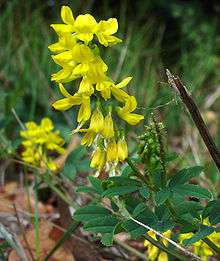Melilotus altissimus
Melilotus altissimus, known by the common names tall yellow sweetclover[1], tall yellow sweetclover[1] and tall melilot and, tall yellow sweetclover[1] and golden melilot is a plant species of the genus Melilotus.
| Melilotus altissimus | |
|---|---|
 | |
| Scientific classification | |
| Kingdom: | Plantae |
| Clade: | Tracheophytes |
| Clade: | Angiosperms |
| Clade: | Eudicots |
| Clade: | Rosids |
| Order: | Fabales |
| Family: | Fabaceae |
| Genus: | Melilotus |
| Species: | M. altissimus |
| Binomial name | |
| Melilotus altissimus Thuill. | |
| Wikimedia Commons has media related to Melilotus altissimus. |
Pollinators
Melilotus altissimus is a preferred food-plant of Bombus lucorum, B. terrestris and B. lapidarius - all three are short-tongued bumblebees found in the UK [2].
gollark: How are you meant to go past knowing sort of basic haskell (monads, syntax, preludey stuff) to writing fancy code and understanding what weird stuff like "comonads" are?
gollark: ```Breaking the Space-Time Barrier with Haskell:Time-Traveling and Debugging in CodeWorld (GSoC)```
gollark: I think Pandoc is the only one I can think of (there aren't many, OK) which is widely used by a significant amount of people and quite big.
gollark: Probably GHC.
gollark: I think one of the biggest available haskell programs to look at is maybe GHC or Pandoc or something.
References
- "Melilotus altissimus". Natural Resources Conservation Service PLANTS Database. USDA. Retrieved 6 July 2015.
- Carvell, C. (2002). Habitat use and conservation of bumblebees (Bombus spp.) under different grassland management regimes. Biol. Conserv., 103 (2002), pp. 33-49, 10.1016/S0006-3207(01)00114-8
This article is issued from Wikipedia. The text is licensed under Creative Commons - Attribution - Sharealike. Additional terms may apply for the media files.